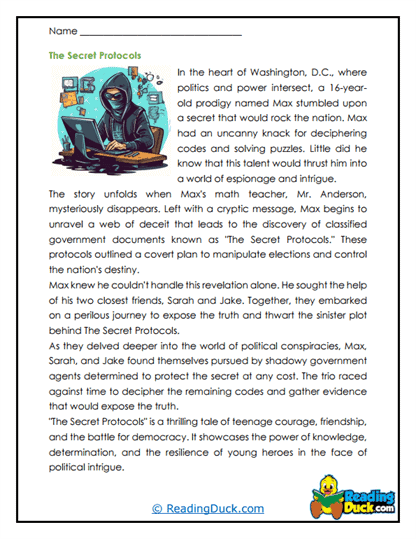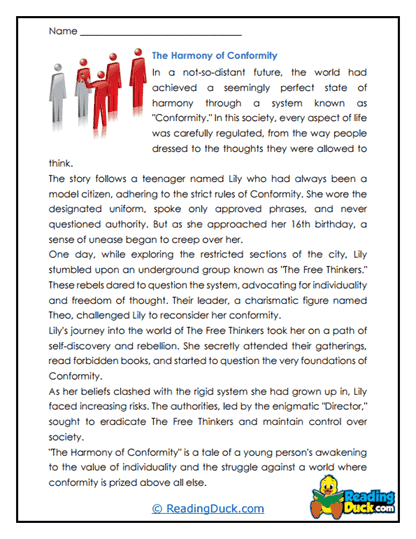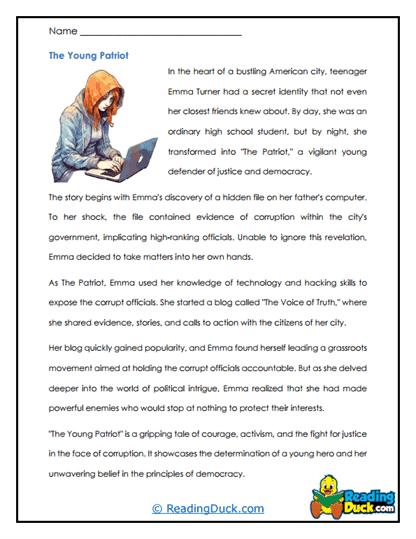Political Fiction Worksheets
About Our Political Fiction Worksheets
Our Political Fiction Worksheets offer students an engaging and thought-provoking journey into a genre that explores the intersections of power, society, and human behavior. Each worksheet set includes a carefully selected reading passage that delves into the key themes of political fiction—often highlighting complex political systems, social justice, and the moral dilemmas faced by individuals living under varying types of authority or governance. The worksheets contain multiple-choice questions for comprehension, short-answer prompts for analysis, and open-ended questions that encourage students to think creatively and critically about the topics covered.
Presented in a PDF format, these worksheets are easy to download, print, and view across devices. Each set comes with a downloadable answer key, simplifying the grading process for educators while maintaining an emphasis on deeper student engagement with the text. These worksheets are ideal for middle school and high school students, although they can be adapted for advanced elementary learners. Designed for use in traditional classrooms, homeschool settings, or independent study, our Political Fiction Worksheets are a versatile tool to help students develop essential skills while grappling with the genre's unique challenges.
Exploring the Depths of Political Fiction
Political fiction is a powerful genre that uses narrative to explore issues of power, governance, and the impact of political decisions on individuals and society. This genre often tackles weighty issues such as corruption, revolution, civil rights, justice, and authoritarianism, while focusing on how politics shape personal lives and societal structures. By examining complex political landscapes, authors of political fiction provide readers with a lens through which to consider real-world issues of freedom, morality, and human rights.
Key themes and characteristics of political fiction include:
- Corruption and power struggles: Many political fiction stories explore how individuals in positions of power can abuse that authority, leading to social injustices or moral decay.
- Revolution and rebellion: Characters often fight against oppressive systems, and the narrative focuses on their struggles, ideals, and the consequences of political upheaval.
- Moral and ethical dilemmas: Characters are frequently placed in situations where they must choose between personal values and political loyalty, forcing readers to consider difficult questions about duty, justice, and individual freedom.
- Reflection on societal issues: Political fiction often acts as a mirror to contemporary societal concerns, such as inequality, totalitarianism, and human rights violations.
Political fiction is essential to literature because it challenges readers to think critically about power structures and the forces that shape human societies. Through its depiction of fictional yet eerily familiar worlds, political fiction highlights how deeply politics influence culture, economy, and the very fabric of human life. Our worksheets help students engage with these narratives, offering them tools to reflect on complex systems, question authority, and draw connections between fictional societies and real-world governance.
Developing Key Skills Through Political Fiction Worksheets
Our Political Fiction Worksheets are not only designed to introduce students to important narratives but also to build a range of essential academic skills. These worksheets are carefully crafted to encourage reading comprehension, critical thinking, and creative expression, all while providing a deeper understanding of political systems and human motivations.
Key skills developed through these worksheets include:
- Reading Comprehension: Multiple-choice questions ensure that students have a solid grasp of the passage's content, asking them to identify key plot points, character motivations, and political dynamics.
- Critical Thinking: Short-answer questions encourage students to delve into the ethical and political dilemmas presented in the text, such as analyzing a character’s response to political corruption or exploring the role of government in maintaining social order.
- Creative Expression: Open-ended questions prompt students to think outside the box, such as imagining alternate story outcomes, proposing new political systems for the fictional world, or writing their own political fiction passage inspired by the themes they’ve explored.
For example, a passage from George Orwell’s "1984" might ask students to analyze the government’s role in controlling information and its impact on personal freedoms. Multiple-choice questions could focus on identifying specific actions taken by the regime, while short-answer prompts could ask students to explain how Orwell uses setting to reflect the oppression in society. An open-ended question might invite students to create a new scenario in which the protagonist organizes a rebellion, fostering both critical analysis and creative thinking.
Investigating the Storytelling Techniques of Political Fiction
Political fiction employs a variety of narrative techniques to engage readers and explore the complex relationships between individuals and power structures. Our worksheets encourage students to study these techniques closely, helping them understand how authors build tension, convey political messages, and challenge readers to think critically about the systems they live within.
Some of the key storytelling techniques students will explore through our Political Fiction Worksheets include:
- Allegory and symbolism: Many political fiction stories use allegories to represent real-world political events, systems, or ideologies. Students may be asked to identify symbols and metaphors that convey deeper political meanings.
- Dystopian settings: Often, political fiction takes place in dystopian worlds, where oppressive governments or exaggerated political systems dominate. Students will analyze how these settings contribute to the theme of political control and societal decay.
- Character as a microcosm: Characters in political fiction often represent broader societal issues. Through these characters, authors explore how individuals react to or resist political systems. Students might be asked to evaluate a character’s role as a symbol of rebellion, loyalty, or corruption.
For example, a worksheet might feature a passage from Aldous Huxley’s "Brave New World", asking students to explore how the author uses the dystopian society to comment on issues like consumerism and state control. A short-answer question could challenge students to examine the character of John the Savage and his reaction to the oppressive, highly controlled world he encounters. Open-ended prompts might ask students to write an additional chapter where the balance of power shifts, allowing them to apply their understanding of political fiction’s narrative techniques to their own writing.
Fostering Analytical and Creative Skills
Our Political Fiction Worksheets are designed to help students sharpen their analytical and creative skills through a mix of thought-provoking questions and imaginative prompts. Political fiction often forces characters—and by extension, readers—to confront difficult choices and engage in complex problem-solving. By analyzing these stories, students develop a deeper understanding of political and social structures, while also honing their ability to evaluate theme, conflict, and character motivation.
Students are encouraged to:
- Interpret complex political systems: Worksheets guide students in evaluating the inner workings of fictional governments, analyzing how power is distributed, and understanding the consequences of political decisions on individuals and society.
- Analyze character motivations and conflicts: Students will explore how characters navigate the challenges of living under political oppression, face moral dilemmas, and resist or comply with the system.
- Create alternative outcomes: Open-ended questions prompt students to imagine alternate story endings or devise their own political systems, allowing them to engage creatively with the genre’s themes and apply their understanding of political fiction to new scenarios.
For example, in a worksheet based on Ray Bradbury’s "Fahrenheit 451", students might analyze how censorship in the novel reflects concerns about government control. Short-answer questions might prompt them to explore Montag’s internal conflict as he transforms from a loyal fireman to a rebellious seeker of truth. Open-ended questions could ask students to imagine a future society where books are once again allowed, challenging them to consider how the power dynamics would change.
Ideal for a Range of Educational Settings
Our Political Fiction Worksheets are flexible and adaptable, making them ideal for a variety of educational environments. Whether used in a traditional classroom, for homeschooling, or in an independent study format, these worksheets provide students with an engaging and structured way to explore the genre.
- In the classroom, these worksheets can be used as part of larger units on political fiction, ethics, or dystopian literature. Teachers can incorporate them into lessons on character analysis, theme exploration, or symbolism.
- For homeschooling, the easy-to-download PDF format allows parents and educators to seamlessly integrate these worksheets into a personalized curriculum. Students can work through the materials at their own pace, and the answer keys provide quick and efficient assessment options.
- Independent learners will benefit from the clear structure and the mix of comprehension, analytical, and creative questions, providing a balanced approach to understanding political fiction.
Supporting Independent and Group Learning
Our Political Fiction Worksheets are designed to support both individual learning and collaborative group work. Students can work through the materials independently, deepening their understanding of political themes, or engage in group discussions that foster debate and collaborative analysis of political systems and conflicts.
Whether used in independent or group settings, these worksheets provide a platform for active learning and critical thinking, allowing students to dive deep into the world of political fiction and emerge with a greater understanding of the forces that shape society.









